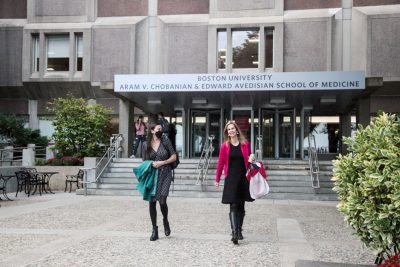Researchers at Boston University have been at the forefront of the study of a degenerative brain disease called chronic traumatic encephalopathy, or CTE.
The disease, which is similar to other degenerative diseases like Alzheimer’s, has become commonly associated with contact sports like football and ice hockey. Michael Alosco, the lead investigator for the CTE Center at BU, said the disease develops most often from years of minor hits to the head.

“We see that repetitive head impacts are the primary risk factor for CTE, meaning tiny hits to the head, (and) thousands of them over the course of someone’s career,” he said.
BU’s CTE Center — founded in 1996 as part of BU’s Alzheimer’s Disease Research Center — published a groundbreaking study in 2017 that sounded the alarm for the immense risks associated with prolonged exposure to head impacts in professional football.
Of the 111 brains of former NFL players that researchers studied, 110 showed some signs of CTE. Beyond professional football, 91% of the brains of former college football players were found to have CTE and 21% of high school players’ brains.
“We really have learned a lot from American football because it does offer a population that has really similar characteristics in terms of their head injuries,” Alosco said. “It’s been a great framework to study the long term repetitive head impacts.”
While many sports fans may be aware of CTE and associate it with concussions or other traumatic head injuries, the actual science behind the disease is far more complex.
“We don’t think that one or even multiple concussions are responsible for this,” Alosco said. “It’s (caused by) that really repetitive nature throughout someone’s life.”
Tau, which Alosco explained is affected by CTE, is a protein that supports neurons in the brain, according to the Alzheimer’s Association.
“Tau (is) really important for good brain function,” Alosco said. “(When) that protein becomes abnormal, it presents in a very unique way that’s unlike any other progressive brain disease.”
There’s still a lot researchers don’t know about CTE and its behavior, specifically how a person living with the disease may show symptoms.
While its research on the area is still somewhat limited, the CTE Center believes that symptoms may show up as a “combination of thinking and memory problems, mood and behavioral problems,” Alosco said.
The CTE Center’s Brain Bank, the largest in the world on CTE tissue and devoted to this research, holds the brains of some notable NFL and NHL names who have been found to have the disease.
While the NFL embraced research from the CTE Center on American football, other organizations — including the NCAA — have been slow to accept the science.
Arturo Aguilar, medical director of sports medicine & athletic training at Boston University, explained that the onus is mainly on the schools to create their own policies regarding athlete safety.
“The NCAA does provide some guidance, but in a lot of ways, we take it as our own responsibility to make sure we flesh that out with the latest research, the latest guidelines and best practices in order to keep our athletes safe,” Aguilar said.
BU Athletics has several policies that expand upon that of the NCAA regarding head injuries and concussions. Some of these include prohibiting the use of athletic equipment as a weapon, prohibiting injuring another player deliberately and maintaining equipment to meet safety standards.
“We work closely with the Department of Athletics, collaborating on how to reduce exposure to head trauma,” Aguilar said.
Those guidelines also educate student-athletes about why the policies are in place.
“We’re focused on trying to influence awareness and educate them about the why behind what we’re trying to get at,” said Nicholas Pfeifer, director of BU’s Athletic Training Fellowship in Neurology.
Teams receive training from a BU Athletics medical staff member who works directly with their team, which Pfeifer said happens yearly.
“That way, they’re building that trust and relationship with their provider that they’re going to work with most directly and really are able to foster that mutual understanding,” he said. “Our big tenants there are talking certainly about what we understand about the long-term risks and what the sequela could be from these injuries or the exposure to head contact from their sport.”
Pfeifer also said that he informally looks to the CTE Center’s research to guide decision-making regarding head injuries.
“I’ve been down to their center a number of times to see their faculty present their research,” Pfeifer said. “There’s certainly quite a bit of influence on how we approach and think about what we’re doing with all of these cases that’s informed by the great research that they’re doing down at that center.”
When it comes to reforming sports to mitigate — or even potentially eliminate the risk of CTE — Alosco believes there is limited hope for football.
“I don’t foresee a way where you could actually change (football) without fundamentally changing the game,” Alosco said. “Other sports where these head impacts aren’t as ubiquitous, like soccer, there’s a lot of room to make modifications for safety reform without perhaps changing the game dramatically..”
Ultimately, Alosco said he believes that potential football players must understand the risks they’re taking by signing up.
“Everyone in general, no matter what it is, does certain things with their life that are associated with certain risks, and that’s going to continue,” he said. “I think what’s really important is (for) people to be educated and aware of the risks.”
Correction: This article previously noted that symptoms of CTE may or may not show, which is untrue. This has been changed for accuracy.























































































































